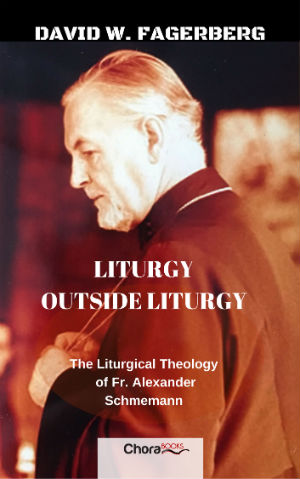
 UST RELEASED this month, a new book by Professor David W. Fagerberg presents a fascinating study of the liturgical theology of Alexander Schmemann. The new volume explores the interconnectivity of liturgy, theology, and piety in a collection of five very accessible lectures.
UST RELEASED this month, a new book by Professor David W. Fagerberg presents a fascinating study of the liturgical theology of Alexander Schmemann. The new volume explores the interconnectivity of liturgy, theology, and piety in a collection of five very accessible lectures.
Schmemann (1921-1983) was a distinguished theologian and protopresbyter of the Orthodox Church. He served as the long-time dean of St. Vladimir’s Orthodox Theological Seminary in Crestwood, NY. His immensely popular book, For the Life of the World (1973), is particularly memorable for his reflection on man as homo adorans: “‘Homo sapiens,’ ‘homo faber’ . . . yes, but first of all, ‘homo adorans.’ The first and basic definition of man is that he is the priest. He stands at the center of the world and unifies it in his act of blessing God, of both receiving the world from God and offering it to God.” 1
Schmemann’s life and writings have been a major scholarly interest for Fagerberg, who is himself a liturgical theologian, lover of Chesterton, and professor at the University of Notre Dame. Among Fagerberg’s other significant books are Theologia Prima (2003), On Liturgical Asceticism (2013), and Consecrating the World: On Mundane Liturgical Theology (2016).

The new book is entitled Liturgy outside Liturgy: The Liturgical Theology of Fr. Alexander Schmemann. It is available on Amazon and elsewhere, both in paperback and electronic format.
Fagerberg explains in his introduction that this new book is a collection of five lectures given in January 2017. Three were given during the course of a seminar on Schmemann at The Academy of St. John in Sweden, while the other two were presented to a doctoral seminar and a group of lay faithful. The texts have not been altered from their format as oral presentations.
The first three lectures draw heavily upon texts written by Schmemann, while the latter two lectures present Fagerberg’s own thought drawn from Schmemann’s work and ideas.
A look at the table of contents will help to demonstrate the timeliness and interest of this book:
Foreword (Chad Hatfield, President of St. Vladimir’s Orthodox Theological Seminary)
Introduction
Part I: A Sketch of Alexander Schmemann’s Though on Liturgy, Theology, and Piety
Chapter 1: Should Liturgy Matter Outside the Church? Schmemann on the Study of Liturgy
Liturgy and the World
Defining Antinomy
The Kingdom and the World Meet in Liturgy
The Liturgical Mission to the WorldChapter 2: Can Theology be Done outside the Academy? Schmemann’s Concept of Theology
The East Path Not Taken
The Harder Path We Will Take
Liturgy as Ontological Condition for Theology
A Conversion RequiredChapter 3: Do We Need Liturgy in Our Life? Schmemann’s Connection between Liturgy and Spirituality
What Liturgical Piety is Not
What Liturgical Piety Is
Baptismal Foundations
Cosmic Priesthood
ConclusionPart II
Chapter 4: Liturgy and the Consecration of the World
Liturgy and Cosmos
Liturgy and Anthropology
Liturgy and Hearts
Liturgy and History
ConclusionChapter 5: On Liturgy, Theology, and Asceticism
A Theological Definition of Liturgy
A Liturgical Definition of Theology
A Liturgical Theology of the World

For those not familiar with the writings of Alexander Schmemann, this new volume might well serve as an introduction. For those who are already familiar with Schmemann, Fagerberg’s work will help to raise new questions and synthesize thoughts from across Schmemann’s corpus.

NOTES FROM THIS ARTICLE:
1 Alexander Schmemann, For the Life of the World: Sacraments and Orthodoxy (Crestwood, NY: St Vladimir’s Seminary Press, 2002), 14-15.

